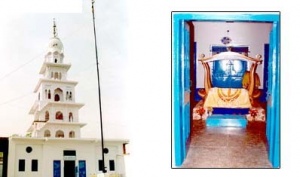Gurudwara Ranjit Garh Sahib: Difference between revisions
No edit summary |
Allenwalla (talk | contribs) m (deleted facts repeated) |
||
| Line 1: | Line 1: | ||
[[Image:Ranjitgarhsahib.jpg|thumb|right|300px|Gurudwara Ranjit Garh Sahib]] | [[Image:Ranjitgarhsahib.jpg|thumb|right|300px|Gurudwara Ranjit Garh Sahib]] | ||
'''Gurudwara Ranjit Garh Sahib''' is situated 200 yards to the east of [[Chamkaur Sahib]]. This Gurdwara is located at the site where [[Guru Gobind Singh]] and the Khalsa defeated a superior, in numbers at least, Mughal force on 16 Magh 1759 Bk/15 January 1703. Gurdwara Ranjitgarh was built only recently to mark the scene of the historic ranjit (victory). This place is therefore known as Ranjitgarh. | |||
==History== | |||
As Guru Gobind Singh was returning from Kurukshetra to [[Anandpur]] early in 1703, a combined Muslim force under the command of two imperial generals, [[Sayyid Beg]] and [[Alif Khan]], was also traveling through the area heading towards [[Lahore]]. | |||
Raja Ajmer Chand of Kahlur, who bore hostility towards the Sikh Guru, managed to persuade the Generals, with the promise of riches, to attack the Guru. The two Mughal forces intercepted the Guru and his Khalsa forces and attacked them on the site of the newly constructed Gurdwara Ranjitgarh. | |||
The Sikhs, though surprised by the superior force, fought tenaciously putting up a spirited defense. It was then that the unexpected happened, General Sayyid Beg coming face to face with the Guru, was so affected by his sight of the Guru that he immediately changed sides. | |||
Alif Khan, chagrined by his colleague's behaviour, attacked with redoubled vigour, but his forces were repulsed. | |||
==See Also== | ==See Also== | ||
Revision as of 14:01, 14 December 2007
Gurudwara Ranjit Garh Sahib is situated 200 yards to the east of Chamkaur Sahib. This Gurdwara is located at the site where Guru Gobind Singh and the Khalsa defeated a superior, in numbers at least, Mughal force on 16 Magh 1759 Bk/15 January 1703. Gurdwara Ranjitgarh was built only recently to mark the scene of the historic ranjit (victory). This place is therefore known as Ranjitgarh.
==History==
As Guru Gobind Singh was returning from Kurukshetra to Anandpur early in 1703, a combined Muslim force under the command of two imperial generals, Sayyid Beg and Alif Khan, was also traveling through the area heading towards Lahore.
Raja Ajmer Chand of Kahlur, who bore hostility towards the Sikh Guru, managed to persuade the Generals, with the promise of riches, to attack the Guru. The two Mughal forces intercepted the Guru and his Khalsa forces and attacked them on the site of the newly constructed Gurdwara Ranjitgarh.
The Sikhs, though surprised by the superior force, fought tenaciously putting up a spirited defense. It was then that the unexpected happened, General Sayyid Beg coming face to face with the Guru, was so affected by his sight of the Guru that he immediately changed sides.
Alif Khan, chagrined by his colleague's behaviour, attacked with redoubled vigour, but his forces were repulsed.

